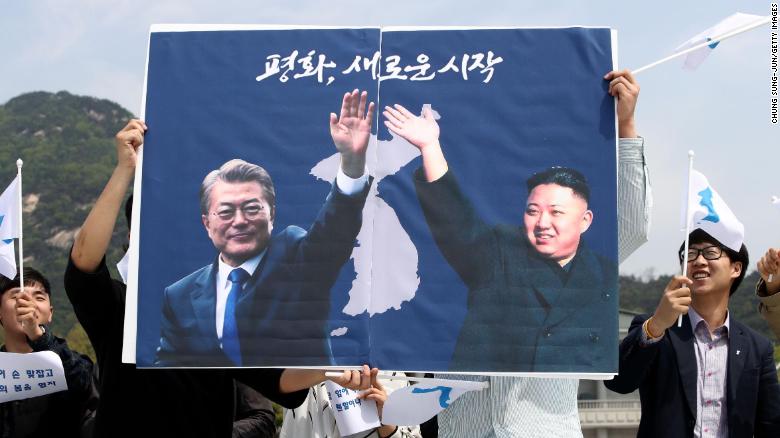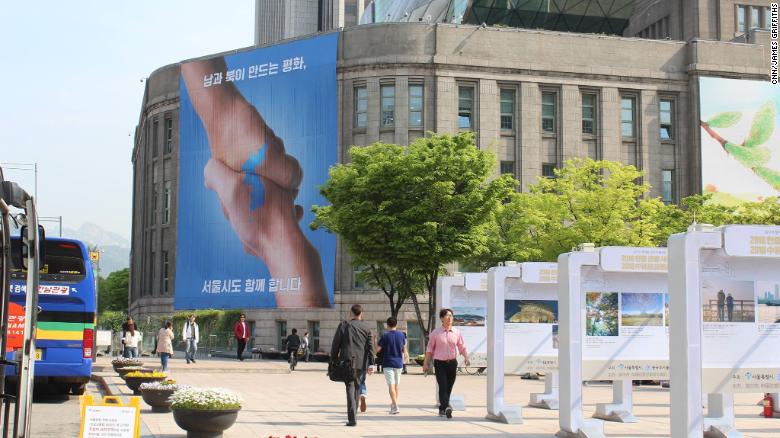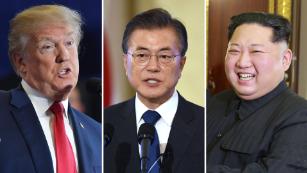남북한간 전쟁이 일어날 위기에서 벗어나 평화를 향해, 김정은이 판문점향해 현재 달리고 있다고 한다. 제발 부탁인데, 정상들이, 남북한 8천만명의 염원을 실현하기위한, 진정한 회담이 성취 되기를 한반도 뿐만이 아니고 전세계가 눈부릅뜨고 지켜보고 있다는점이다. 대한민국은 자유민주주의 국가임을 가슴속에 새기고, 회담에 임하기를 간절히부탁한다.
토론토 시간으로 26일 오후 8시30분에 두정상간의 회담이 시작된다.
From brink of war to hopes of peace: Kim Jong Un heads south for summit.
(CNN)For the first time in over a decade, the leaders of a divided Korea will sit down Friday to negotiate an end to a decades-long rivalry which has threatened at times to plunge the world into nuclear war.
In a meeting heavy with history and symbolism, North Korean leader Kim Jong Un will hold talks with South Korean President Moon Jae-in at the Peace House on the southern side of the demilitarized zone that divides the two countries.
Three potentially world-changing topics are on the agenda for the meeting -- denuclearization of the Korean peninsula, a peace settlement and the improvement of inter-Korea relations.
Around downtown Seoul, the South Korean capital, giant blue posters and billboards display the slogan "Peace, a new start," while others show a unified Korean Peninsula over an image of shaking hands.
The summit is the result of months of diplomatic wrangling and negotiating on the part of Moon, a longtime advocate of peace between the Koreas. It will also set the stage for the first meeting between a sitting US president and North Korean leader when Donald Trump and Kim meet in May or June.
However, stakes are high and some observers are doubtful the two sides can bridge the gapcreated by 60 years of antagonism and suspicion.
"The problem has always been the two Koreas have never been able to fully implement their past agreements that agree on peace and establishing peace," Duyeon Kim, visiting senior fellow at the Korean Peninsula Future Forum, told CNN.
"In practical terms, what's the first step you take toward peace?"
Rumors of peace treaty
Moon and Kim will meet for the first time at 9.30 a.m. local time on Friday (8.30 p.m. Thursday ET), the South Korean President's chief of staff Im Jong-seok announced Thursday.
Cameras from around the world will be fixed on the moment Kim steps across the demarcation line that runs through the demilitarized zone between the two countries.
It is the third summit between the leaders of North and South Korea -- the last was in 2007 when then-South Korean President Roh Moo-hyun met Kim's father Kim Jong Il. President Moon was Roh's chief of staff and a close personal friend. Both previous meetings were held in the North Korean capital, Pyongyang.
Friday's summit will begin at 10.20 a.m. and will run until lunchtime, after which Kim and Moon will plant a pine tree as a prayer for peace and prosperity between the two countries.
As with all aspects of Friday's talks, the planting will be deeply symbolic -- the soil to be used is a mixture from both sides of the border, as is the water that will be poured on the newly planted tree.
"It's very different from Moon going to Pyongyang or Kim coming to Seoul," John Delury, professor at Yonsei University's Graduate School of International Relations in Seoul, told CNN.
"The location itself ensures it's a working meeting. Now within that context, they're breaking bread, they're spending a full day together, so that's important."
While there is no indication yet as to what Kim and Moon are likely to agree, Im said an announcement would be made after the summit and an agreement would be signed.
Then the pair will attend an elaborate dinner, to be held around 6.30 p.m. local time, that will include symbolic dishes originating from both countries.
As Moon and Kim leave the banquet, they will watch a video projected on the side of the Peace House, portraying the past, present and future of the Korean Peninsula.
Rumors of peace treaty
The South Korean government has sought to make the event as open and transparent as possible, organizing a free live broadcast for South Koreans to watch on their phones or on giant TV screens in public places.
"They're trying to create a moment. They're trying to open a window of understand and dialogue and figure out how to solve problems," Delury said.
Speculation in recent weeks has focused on the possibility that Moon and Kim's meeting could lead to the signing of a peace treaty between the North and the South, officially ending the Korean War after almost 70 years.
Caught between advancing Soviet forces and the United States military, the two countries were first divided after the end of World War II.
Tensions between the freshly-split Koreas led to a bloody war beginning in 1950 and only ended with the signing of the armistice in 1953. However, no peace treaty was ever officially signed.
Over the next 60 years the two countries have had a rocky, tense relationship, worsening in the past five years amid Pyongyang's concerted push to develop its missile and nuclear programs.
One topic unlikely to be raised during the discussions is North Korea's atrocious human rights record, which a United Nations report in March said left "people at the mercy of unaccountable public officials."
North Korea, ruled with an iron fist by Kim, restricts its citizens' movements, freedom of expression and access to basic essentials, as well as running what is widely considered to be an extensive and brutal system of prison camps.
Kim took over as leader following his father's death in 2011, extending the Kim family's authoritarian rule that began with his grandfather and founder of the country, Kim Il Sung.
Denuclearization
For the estimated 2,000 local and international journalists attending the summit, one topic will draw more attention than any other -- will North Korea agree to any form of denuclearization?
Threats of war loomed over the Peninsula towards the end of 2017, after Pyongyang announced it had developed the ability to strike the United States mainland.
Only a few months later, Kim has publicly promised to end North Korea's nuclear program and said he is willing to join in talks on denuclearization "of the Korean Peninsula."
Speaking to CNN Thursday, South Korean Foreign Minister Kang Kyung-wha said Trump deserved the credit for bringing North Korea to the negotiating table for the first time in years. "He's been determined to come to grips with this from day one," Kang said.
Evans Revere, former State Department expert on North Korea, told CNN the most important outcome of Friday's talks would be whether or not Pyongyang was serious about dismantling its nuclear arsenal.
"One of the critical priorities for the South Korean President I think is to try to get them on the record saying something more substantial and concrete in terms of denuclearization," he said.
Many experts have pointed to broad misunderstandings in what "denuclearization" means for Pyongyang and the United States. Moon insists both countries are on the same page.
Revere said he was one of the "many skeptics" who were not holding their breath for many concessions by North Korea on their nuclear program.
"The North Korean language thus far has not been very specific ... that suggests that they're not being particularly serious about denuclearization," he said.
https://www.cnn.com/2018/04/26/asia/kim-jong-un-north-korea-south-korea-summit-intl/index.html
https://www.nytimes.com/2018/04/26/world/asia/korea-kim-moon-summit.html?rref=collection%2Fsectioncollection%2Fworld&action=click&contentCollection=world®ion=rank&module=package&version=highlights&contentPlacement=2&pgtype=sectionfront




No comments:
Post a Comment